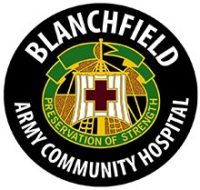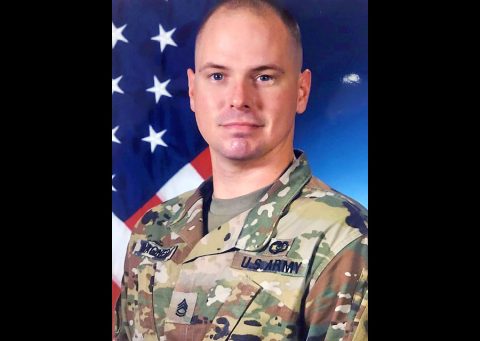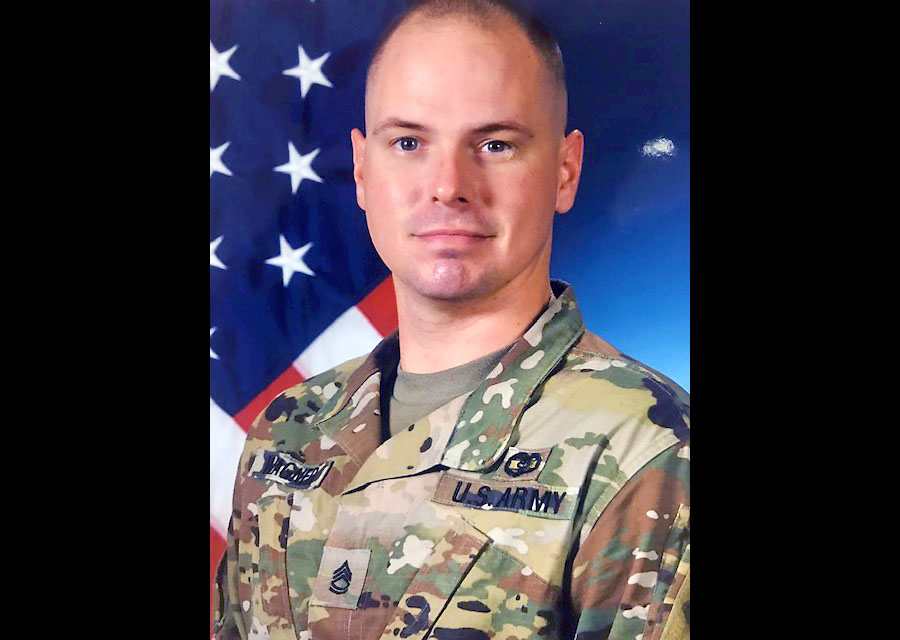Blanchfield Army Community Hospital Public Affairs
 Fort Campbell, KY – A combat medic specialist currently assigned to Blanchfield Army Community Hospital on Fort Campbell, Kentucky was named the 2020 Angel of the Battlefield for the United States Army during a virtual ceremony with Gen. Mark A. Milley, Chairman of the Joint Chiefs of Staff, October 27th, 2020.
Fort Campbell, KY – A combat medic specialist currently assigned to Blanchfield Army Community Hospital on Fort Campbell, Kentucky was named the 2020 Angel of the Battlefield for the United States Army during a virtual ceremony with Gen. Mark A. Milley, Chairman of the Joint Chiefs of Staff, October 27th, 2020.
Sgt. First Class Kyle J. Wagner was among five recipients honored by the Armed Services YMCA for selfless courage and unwavering sacrifice while saving lives on the front lines overseas or during emergencies at home. The program honors angels nominated from each service for actions from the past and present.

In 2013, while assigned to support Soldiers of the 2nd Engineer Battalion, 36th Engineer Brigade, Wagner was sent to provide medical coverage to a combat engineer platoon conducting dismounted route clearance south of Forward Operating Base Ghazni, Ghazni Province, Afghanistan.
“Route clearance is a very dangerous task. You go out looking for IEDs and I have to say the unit I was with was very good. We found a lot of them. It’s just sometimes they found us instead,” said Wagner.
During the platoon’s search for command lines and potential threats to coalition forces, Wagner said a coalition Soldier stepped on a pressure plate that detonated an improvised explosive device.
Within 15 feet of the explosion, Wagner was thrown back by the force of the blow. Disoriented, injured and unable to hear, his Army training immediately kicked in. He gathered himself and moved quickly back into the dust cloud to search for casualties from the blast.
He immediately moved Soldiers from the blast area to where he could safely begin triage, applying emergency treatment to the unit’s interpreter who received life-threatening amounts of shrapnel and multiple burns to his face and exposed skin.
He then moved over a wall into a field beyond the blast site to care for the injured coalition Soldier, providing bleeding control measures to the Soldier who was missing much of his lower extremities.
Wagner continued to provide aid as he arranged for the medical evacuation of wounded Soldiers.
“It was a long day,” said Wagner, who now serves as the non-commissioned officer in charge of BACH’s Department of Surgery.
Wagner now keeps busy overseeing Soldiers and civilian staff at the hospital where he is responsible for their training, accountability, morale, welfare, and administration. “On the battlefield, things are quite a bit simpler and your adrenalin will make you do some pretty awesome things. Things that you didn’t think you were capable of doing,” he said.
Here, older and more experienced, Wagner with his fellow NCOs, share their knowledge through organized training with the junior medics and techs in the department and on the installation. They volunteer their time outside of their clinical duties to help keep medical Soldiers proficient on skills used outside the hospital because that is an important aspect of Soldier readiness and a ready medical Force.
“Knowledge and experience are wonderful things to have but they are pointless if you don’t share them. The training that we do reinforces that muscle memory so that when something does go sideways or something bad does happen, you don’t really think, you just react, because it’s been engrained in you so many times,” said Wagner, speaking from his own experiences and lessons learned down range.
Before coming to BACH, Wagner served as an instructor at the U.S. Army Medical Center of Excellence at Joint Base San Antonio-Fort Sam Houston. Wagner said he wanted to have a hand in training the Army’s aspiring combat medic specialists so that he could teach the new incoming medics what battlefield medicine is all about.
“I had great success as an instructor and I had a lot of good Soldiers that we trained and sent out to the force to support the warfighter,” he said. “I tell my Soldiers and told my students to train as if someone’s life depends on it because one time, it might. That’s how seriously we take training.”
For the Soldiers in his unit that day, on deployment in Afghanistan, Wagner’s training and experience made the difference.
“These awards are presented to medics, to corpsmen, to pararescue personnel for their bravery and sacrifice while selflessly providing lifesaving care on the front lines of freedom,” said Gen. Mark A. Milley, chairman of the Joint Chiefs of Staff, and keynote speaker at the event, calling the awardees, heroes of our heroes.
“There are a lot of people who have done equal to, if not greater than, what I have so it’s a humbling experience. I’m really honored that I get to represent the U.S. Army and BACH.
The Armed Services YMCA Angels of the Battlefield has been held annually since 2006. It recognizes angels who serve as medics, corpsmen, and pararescue service members representing five branches of the U.S. Armed Forces.



